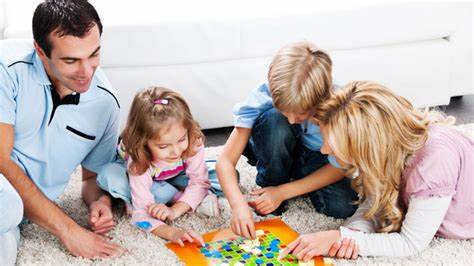My older son recently made a vending machine out of a cardboard box. My daughter created clothing for her Barbies out of paper and tape. My baby went through the hall closet, describing the shoes in a babble that was only one-eighth English. All three participate in a steampunk-inspired world of their own creation called Gearton, for which they build castles and a clock tower out of picture books. When their games are going well, the kids are murmuring, saying to one another, "Pretend we..." or "What if we..." or "The queen must be assassinated." There's also a lot of screaming. Meanwhile, I'm doing the crossword.
我的大儿子最近用纸板箱做了一台自动售货机。我女儿用纸和胶带为她的芭比娃娃做了衣服。我最小的孩子穿过大厅的衣柜,用只有八分之一英语的咿呀学语声描述鞋子。这三个孩子都在玩由蒸汽朋克启发、自己创造世界的游戏Gearton,用图画书建造城堡和钟楼。在游戏进行得很顺利时,孩子们会喃喃低语,对彼此说,“假装我们……”或者“如果我们……”或者“女王一定被暗杀了”之类的话。他们也会发出很多尖叫声。与此同时,我在玩填字游戏。
I have three kids under 10 who don't expect — or even want — to play with me. It took some practice, but over time, we've all learned we're better off doing our own thing: the kids, without stodgy parental interference, and my husband and I, unhooked from the assumption that we have to play to be present.
我有三个不到10岁的孩子,他们并不期待——或者说甚至不想——和我一起玩。这需要一些练习,但随着时间的推移,我们都认识到我们最好做自己的事情:孩子没有乏味的父母干预,而我和我丈夫则摆脱了我们必须假装自已参与其中这种责任。
It wasn't always this way. As a toddler, if my first child wasn't digging in the trash or chewing on the couch cushions, he was rampaging through the house with an imaginary weapon. He never listened. He tried to run into traffic. The constant wrangling and vigilance were so exhausting that my husband and I didn't have the energy to play the way my son preferred — anything that involved full-body contact or pretend violence. Instead, I said no and stop all day long, and when my scolding seeped into the playing, I felt guilty and frustrated. I was a terrible playmate, a tired mother who did little beyond obstructing.
但并非总是这样。我的第一个孩子在蹒跚学步时,如果不是在垃圾堆里挖东西,也没有在沙发垫上嚼东西的话,那他就是在用想象中的武器在屋子里横冲直撞。他从来不听话。他甚至想冲进车流。不断的争吵和警惕让我精疲力尽,我和丈夫都没有精力按我儿子喜欢的方式玩耍,因为他喜欢所有涉及全身接触或假装暴力的游戏。相反,我拒绝了他,一整天都没有陪他玩,当我的责骂渗透到玩乐时间,我感到内疚和沮丧。我是一个糟糕的玩伴,一个疲惫不堪的母亲,除了阻拦之外,什么也没做。
 But when my son was about 3, I realized his fictive worlds were vivid enough to continue without me. All he needed, at first, was a listener. After a while, he would head into his bedroom, alone, to transform it into the place that lived in his mind. It was freedom — for all of us. Thus began an experiment with expectation: Little by little, my husband and I would stretch the time our son could safely play by himself.
But when my son was about 3, I realized his fictive worlds were vivid enough to continue without me. All he needed, at first, was a listener. After a while, he would head into his bedroom, alone, to transform it into the place that lived in his mind. It was freedom — for all of us. Thus began an experiment with expectation: Little by little, my husband and I would stretch the time our son could safely play by himself.
但在我儿子3岁左右的时候,我意识到他的虚拟世界足够生动,没有我也可以持续下去。起初,他只需要一个倾听者。过了一阵,他会独自一人走进卧室,将卧室改造成他心目中的地方。对我们所有人来说,这是自由。于是,一个充满期待的实验开始了:我和丈夫会逐渐延长儿子独自安全玩耍的时间。
My daughter was born a year after that. She is shy and moody, and she has been content to play on her own since she could crawl. I've never met a more self-possessed child — she used to tell me when she needed a nap. She has never liked the sorts of games her brother prefers, and play between them has always been a negotiation. The games they've created combine his love of fantasy and drama with her need for realism; when they set up their pretend yak farm with pillows and stuffed animals, she enjoys an imagined sunset, while her brother worries about predators who have yet to grace this earthly plane.
我女儿在一年后出生。她腼腆而且情绪多变,从会爬起,她就愿意自己玩。我从来没有遇到过比她更沉着的孩子,她经常告诉我她什么时候需要小睡。她从未喜欢过她哥哥喜欢的那种游戏,他们两人之间的游戏一直是种谈判。他们创造的游戏结合了我儿子对幻想和戏剧的热爱以及我女儿对现实主义的需求;当他们用枕头和毛绒玩具搭建起他们的假牦牛农场时,她享受着想象中的日落,而她的哥哥则在担心尚未出现但会增添色彩的掠食者。
译文由可可原创,仅供学习交流使用,未经许可请勿转载。
 But when my son was about 3, I realized his fictive worlds were vivid enough to continue without me. All he needed, at first, was a listener. After a while, he would head into his bedroom, alone, to transform it into the place that lived in his mind. It was freedom — for all of us. Thus began an experiment with expectation: Little by little, my husband and I would stretch the time our son could safely play by himself.
But when my son was about 3, I realized his fictive worlds were vivid enough to continue without me. All he needed, at first, was a listener. After a while, he would head into his bedroom, alone, to transform it into the place that lived in his mind. It was freedom — for all of us. Thus began an experiment with expectation: Little by little, my husband and I would stretch the time our son could safely play by himself.











